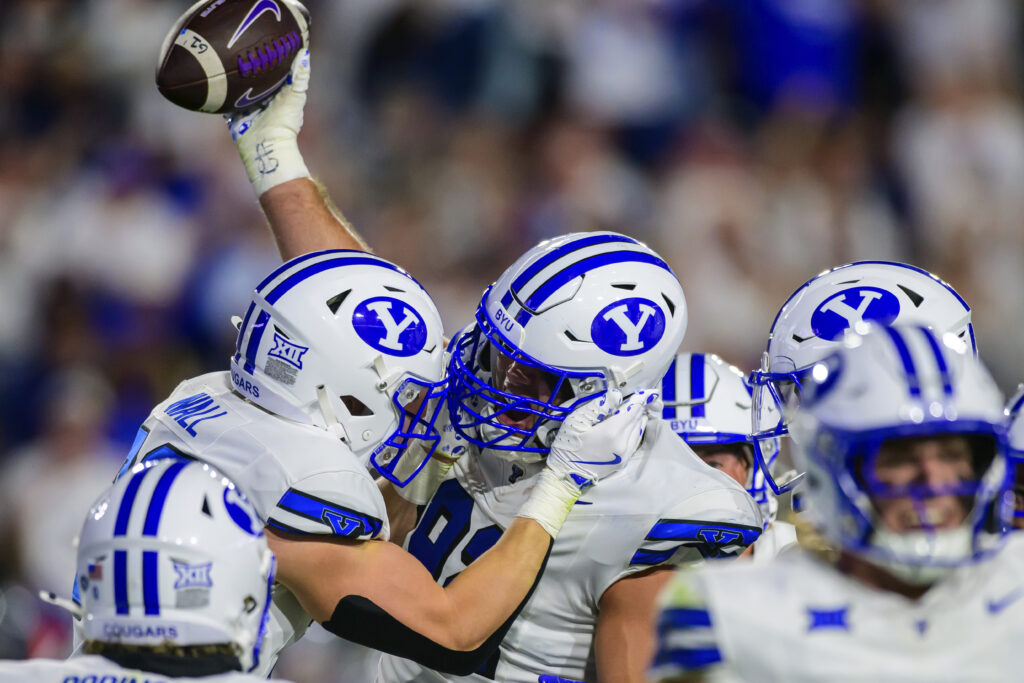For roughly six days, the Holy War appeared momentous.
That sense of next-level significance began on the night of Sept. 21, after Brigham Young polished off Kansas State in resounding fashion, improved to 4-0 and looked, for the first time, like a contender in the Big 12.
Earlier in the day, 12th-ranked Utah had overwhelmed Oklahoma State on the road with a backup quarterback (Isaac Wilson) and continued its undefeated start.
The Utes were the team everyone expected, the Big 12 favorites and a College Football Playoff candidate.
The Cougars were the team nobody expected, the surging disruptor in a conference stocked with disruption.
And the Holy War, looming on the November horizon, looked like it would carry enormous stakes for both teams.
That tantalizing backdrop lasted six days. Then Utah collapsed, BYU ascended and the 102nd rivalry game took on a distinctly one-sided hue.
Talk about the unexpected:
— The Cougars, picked 13th in the Big 12 preseason media poll, are taking an undefeated record into the stretch run.
— The Utes, picked to win the conference, are schlepping a four-game losing streak into November.
Their offense is offensive.
Their starting quarterback, Cam Rising, is done for the year.
Their playcaller, Andy Ludwig, is done for his career (at least in Salt Lake City).
And coach Kyle Whittingham is scrambling to salvage the season before the absolutely unthinkable happens and the Utes (4-4) don’t qualify for a bowl game.
A few miles down the road — and a world away — the ninth-ranked Cougars (8-0) are on the short list of the biggest surprises in the sport, one of seven teams in the power conference without a blemish. Their finishing schedule features four teams with a combined record of 6-13 in conference play.
One of those teams — the next team — is Utah.
The Holy War is 10 days away, scheduled for an 8:15 p.m. Mountain start in Rice-Eccles Stadium.
A collision that, for those six delicious days in late September, looked good enough for an afternoon kickoff on broadcast television is, instead, on ESPN in the night window.
The combatants are idle until then.
The Hotline is not.
To gain context on what to expect from a matchup that has been flipped on its head, with Utah winless since September and BYU loss-less since training camp, the Hotline’s crack research team plowed through a quarter-century of Holy War history.
We examined the final scores, betting lines and circumstances to identify trends that could be relevant next week.
(Note: We did not include the 2015 Las Vegas Bowl matchup; only regular-season games played in Salt Lake City and Provo were considered.)
First, know this: The opening line for the Nov. 9 showdown, which was set before the season began, listed the Utes as 17-point favorites. The current line shows BYU favored by 4.5 points.
Nothing reflects the plot twist that has unfolded along I-15 better than the 21.5-point swing.
Now, the relevant trends:
— Utah has won seven of the past eight, and 14 of the past 20, regular-season matchups, which covers a 25-year span because the teams did not meet in 2014-15, 2020 or 2022-23.
— The underdog covered the spread in 15 of those 20 games.
— As the favorite, which they assuredly will be next week, the Cougars are 4-5 straight up and 1-8 against the spread.
— As the home underdog, the Utes are 1-1 straight up and 2-0 against the spread.
Those rare instances came in 2006, when BYU was favored by 10 in Rice-Eccles Stadium and won by two, and in 2012, when BYU was favored by three and lost by three.
— On three occasions in the past quarter-century, the trappings that exist today were present: The Cougars were ranked; the Utes were not.
One of those meetings, in 2012, was the third game of the year, so we shouldn’t read much into Utah’s 24-21 victory.
But in 2006 and ’07, the Holy War came at the end of the season.
On the first occasion, No. 21 BYU was favored by 10 and escaped Rice-Eccles with a 33-31 victory.
The second time, No. 23 BYU was favored by four and repelled the Utes 17-10 in Provo.
— When playing at home over the past 20 meetings, the Utes are 7-2 straight up and 4-5 against the spread.
— When one team has at least three more wins than the other at the time of kickoff, the team with the better record is 3-0 straight up but 1-2 against the spread.
Those situations occurred in 2003, when Utah was favored by seven and won 3-0; in 2004, when Utah was favored by 21 and won by 31; and 2010, when Utah was favored eight and won by one.
That will be the case next week, of course.
The Cougars have twice as many wins (eight) as the Utes, a role reversal that we could not have envisioned when the season began.
It makes us wonder if the latest installment of the Holy War will produce something else nobody could have foreseen.
*** Send suggestions, comments and tips (confidentiality guaranteed) to wilnerhotline@
*** Follow me on the social media platform X: @WilnerHotline
Related posts:
 Brandon Huffman Pac-12 recruiting notebook
Brandon Huffman Pac-12 recruiting notebook

(AP Photo/Tony Gutierrez)
Big 12 commissioner Brett Yormark asks Arizona Board of Regents for continued investment in athletics Wilner Mailbag: Likelihood of a super league (or super teams), ACC sustainability, the CFP’s future, WSU and OSU revenue sharing and more
Wilner Mailbag: Likelihood of a super league (or super teams), ACC sustainability, the CFP’s future, WSU and OSU revenue sharing and more

Big Ten Commissioner Tony Petitti (AP Photo/Darron Cummings)
Big Ten reveals tiebreaker policy: As intricate as it should be under the circumstancesJon Wilner
Jon Wilner has been covering college sports for decades and is an AP top-25 football and basketball voter as well as a Heisman Trophy voter. He was named Beat Writer of the Year in 2013 by the Football Writers Association of America for his coverage of the Pac-12, won first place for feature writing in 2016 in the Associated Press Sports Editors writing contest and is a five-time APSE honoree.
